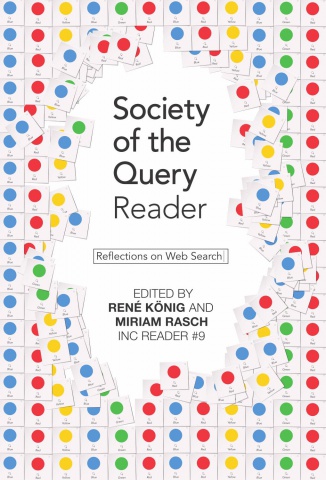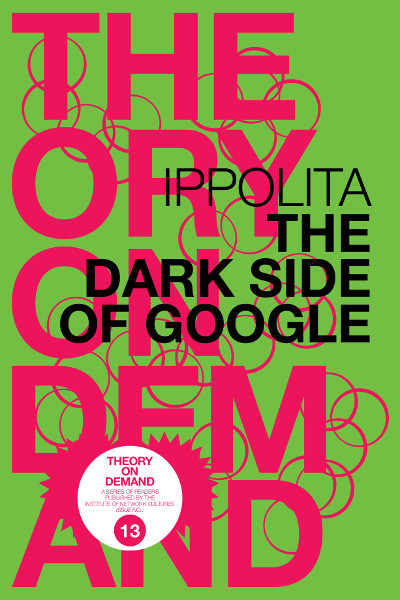René König, Miriam Rasch (eds.): Society of the Query Reader: Reflections on Web Search (2014)
Filed under book | Tags: · algorithm, google, internet, memory, search, software, technology, web

Looking up something online is one of the most common applications of the web. Whether with a laptop or smartphone, we search the web from wherever we are, at any given moment. ‘Googling’ has become so entwined in our daily routines that we rarely question it. However, search engines such as Google or Bing determine what part of the web we get to see, shaping our knowledge and perceptions of the world. But there is a world beyond Google – geographically, culturally, and technologically.
The Society of the Query network was founded in 2009 to delve into the larger societal and cultural consequences that are triggered by search technology. In this Reader, which is published after two conferences held in Amsterdam in 2009 and 2013, twenty authors – new media scholars, historians, computer scientists, and artists – try to answer a number of pressing questions about online search. What are the foundations of web search? What ideologies and assumptions are inscribed in search engine algorithms? What solution can be formulated to deal with Google’s monopoly in the future? Are alternatives to Google even thinkable? What influence does online search have on education practices? How do artists use the abundance of data that search engines provide in their creative work? By bringing researchers together from a variety of relevant disciplines, we aim at opening up new perspectives on the Society of the Query.
Contributors: Aharon Amir, Vito Campanelli, Dave Crusoe, Angela Daly, Vicențiu Dîngă, Martin Feuz, Ulrich Gehmann, Olivier Glassey, Richard Graham, Mél Hogan, Ippolita, Kylie Jarrett, Min Jiang, Anna Jobin, Phil Jones, Simon Knight, Dirk Lewandowski, M.E. Luka, Astrid Mager, Martina Mahnke, Andrea Miconi, Jacob Ørmen, Martin Reiche, Amanda Scardamaglia, Anton Tanter, and Emma Uprichard.
Publisher Institute of Network Cultures, Amsterdam, 2014
INC Reader, 9
Creative Commons Attribution NonCommercial ShareAlike 3.0 Unported License
ISBN 9789081857581
292 pages
Website of the network
Publisher
Ippolita: The Dark Side of Google (2007–) [IT, FR, ES, EN]
Filed under book | Tags: · algorithm, capitalism, database, free software, google, open source, search, software, technology

In The Dark Side of Google Italian writers’ collective Ippolita provides a thorough, fresh analysis of what is behind the universe of Google and the metadata industry. In recent years Google has established itself as a major point of Internet access. We have progressively adapted to its sober, reassuring interface and its advertisements (discretely off to the side, yet always present). We have adopted its services and the habit of using it to the degree that ‘googling’ has become a form of behavior: ‘If you don’t know what it is, Google it!’
Google shows mastery in taking advantage of our need for simplicity. We sit in front of a colossus, an incredibly pervasive system of managing knowledge, comprising aggressive marketing and shrewd management of its own image, and the propagation of highly configurable interfaces that are still implacably recognizable. What is more, Google co-opts methods for developing Free Software, the use of futuristic systems for gathering and storing data. What lies behind the most consulted search engine in the world?
Italian edition
Publisher Feltrinelli, Milan, 2007
English edition
Translated by Patrice Riemens
Publisher Institute of Network Cultures, Amsterdam, 2013
Theory on Demand series, Vol. 13
Creative Commons Attribution Noncommercial No Derivative Works 3.0 Netherlands License
ISBN 9789081857567
110 pages
Luci e ombre di Google (Italian, 2007, draft)
La face cachée de Google (French, trans. Maxime Rovère, 2010, draft)
El lado oscuro de Google (Castilian, trans. Pino and Maria, 2010)
The Dark Side of Google (English, trans. Patrice Riemens, 2013)
Theo Röhle: Der Google-Komplex: Über Macht im Zeitalter des Internets (2010) [German]
Filed under book | Tags: · actor-network theory, google, internet, media studies, media theory, software, surveillance

Meistgenutzte Suchmaschine, weltgrößter Datensammler, teuerstes Medienunternehmen – es liegt nahe, »Google« als Supermacht zu bezeichnen. Und doch greift diese Beschreibung zu kurz.
Unter Bezug auf Michel Foucault sowie die Akteur-Netzwerk-Theorie entwickelt Theo Röhle ein präzises, relationales Verständnis von Macht, das den Blick auf die vielfältigen Interaktionen der beteiligten Akteure öffnet und ein komplexes System von Verhandlungen zutage fördert.
Eine zeitgemäße Analyse digitaler Medienmacht an der Schnittstelle von Medienwissenschaft, Informationswissenschaft und Surveillance Studies.
Publisher transcript, Bielefeld, 2010
ISBN 9783837614787
266 pages

